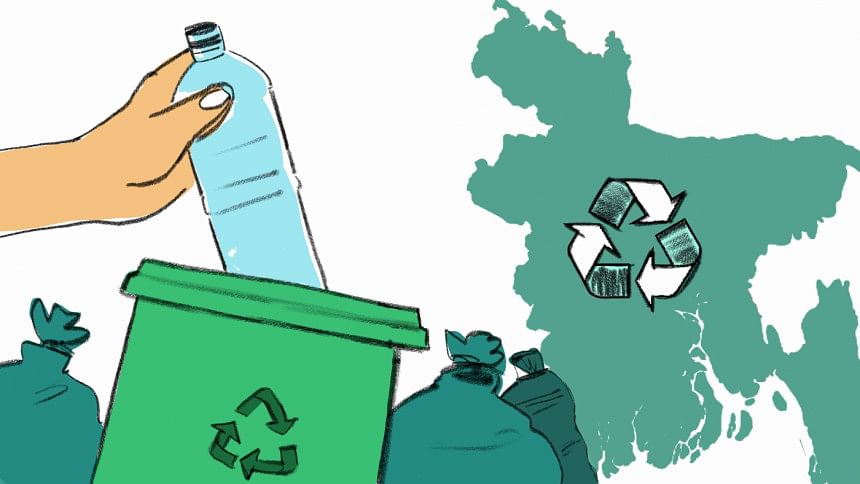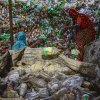How can Bangladesh improve its waste management?

Sufia is a middle-aged woman working for ZeroWaste Tech, a startup in Dhaka. Every morning, she wears her safety jacket, gloves, boots, and helmet with the powered air-purifying respirator. After checking her smartphone in her allocated region, where the garbage is full and needs to be managed, she goes out with her other mates, collects garbage, and puts it in their targeted dump site near the city. The dump site has also classified areas such as plastics, biowaste, glass, e-waste, etc. Her team then divides the waste accordingly and puts them in each place. Then, the waste is processed further to minimise carbon emissions and can be converted into renewable energy.
This scenario, with the character and the startup, is imaginary, but it can be a reality.
Bangladesh has been facing severe problems in waste management for decades. Several initiatives have been taken, but they have not been effective due to their irregular implementation. The above-mentioned scenario can be made real especially in Dhaka, the most overpopulated city in Bangladesh, where garbage and waste can be seen everywhere, from main roads to narrow alleyways. In the rainy season, the problem intensifies tremendously because of poor drainage systems.
According to projections, the country's daily waste generation rate is expected to reach 0.80 kg per capita per day by 2030 and 1.19 kg per capita by 2041. So effective measures should be taken right now.
Electronic gadget usage is rising around the world, and Bangladesh is no different. This rising usage leaves a vast amount of electronic waste, which should be appropriately discarded. At the same time, most of it should be recycled and used for new purposes. The challenges in recycling e-waste in Bangladesh include the lack of formal collection systems, insufficient recycling infrastructure, and limited public awareness about the environmental impact of improper e-waste disposal. Informal recycling practices often involve hazardous processes that frequently exacerbate the process and harm both the environment and workers.
Ideas from various countries can be adopted and implemented in Bangladesh to reduce as well as to manage waste in a better way. For example, any citizen can deposit waste into certain places proposed by government or private organisations and get cash or various credits. Those credits can be used for discounts on utility bills. Also, designated dustbins can be used for general and recyclable waste. This waste can be collected as soon as the bins are full, sending notifications to the waste management companies as the whole system will be based on IoT with the bins having sensors.
Japan, Canada, and the European Union have implemented Extended Producer Responsibility (EPR), which holds producers (manufacturers, importers, sellers) accountable for making their products for the entire lifecycle, even after the consumer stops using them. This means that the producers are not only responsible for making the products but also must be a part of the waste management of their products. They have some policies, like the take-back policy, which provides facilities for the consumers to return used products. They also have recycling obligations. These schemes encourage them to reduce waste by contributing to the government or third-party waste management initiatives.
Food waste can be redirected to renewable energy sectors to produce biogas. For instance, South Korea has implemented a mandatory food waste recycling programme where food waste is collected separately and processed into biogas and animal feed. Such a system not only reduces landfill usage but also contributes to renewable energy production and agricultural sustainability. Bangladesh could adopt a similar model by establishing dedicated food waste collection and processing centres in urban areas.
Startups focusing on areas like waste-to-energy technologies, recycling infrastructure, and eco-friendly alternatives to plastics should be encouraged. For example, companies that focus on converting waste materials, such as plastic and organic waste, into valuable fuels and energy can make a huge impact and significantly reduce waste.
Public campaigns to educate citizens about waste segregation, recycling, and the environmental consequences of improper waste disposal are crucial. Effective methods could include integrating waste management topics into school curricula to instil habits from an early age and organising interactive workshops in communities. Social media campaigns using influencers and local celebrities can also raise awareness and encourage sustainable practices. These approaches can ensure that the message reaches a diverse audience and promotes active participation.
Indeed, the widespread use of plastic bags has largely been replaced with eco-friendly alternatives like jute and paper bags, but this practice should be implemented more strictly. Modern landfills equipped with gas recovery systems can also reduce the environmental impact of plastic waste and other non-recyclables. These systems capture methane, a potent greenhouse gas typically released from decomposing waste in landfills, which can be converted into renewable energy and reduce air pollution.
Additionally, setting up innovation hubs and providing access to research facilities could foster the growth of sustainable businesses and enrich the research sector for this cause. For instance, exploring methods like bioleaching, a process where bacteria safely extract valuable materials from electronic waste, can be a game-changer. This technique not only minimises environmental harm but also provides a sustainable approach to recycling and resource recovery. By encouraging such advancements, Bangladesh can pave the way for a more sustainable and efficient waste management system.
While many initiatives are being undertaken to reduce waste, a more cohesive and systematic effort is needed to overcome the flaws of the current waste management system. The government should establish clear and enforceable guidelines and strong legislation, and ensure practical policy implementation, which are essential to drive meaningful change in this respect. By learning from global best practices, fostering innovation, and raising public awareness, Bangladesh can transform its waste management system into one that is more sustainable, efficient, and environmentally responsible.
Shaikh Afnan Birahim is a postgraduate student of computing science at the University of Glasgow.
Views expressed in this article are the author's own.
Follow The Daily Star Opinion on Facebook for the latest opinions, commentaries, and analyses by experts and professionals. To contribute your article or letter to The Daily Star Opinion, see our guidelines for submission.

 For all latest news, follow The Daily Star's Google News channel.
For all latest news, follow The Daily Star's Google News channel. 










Comments